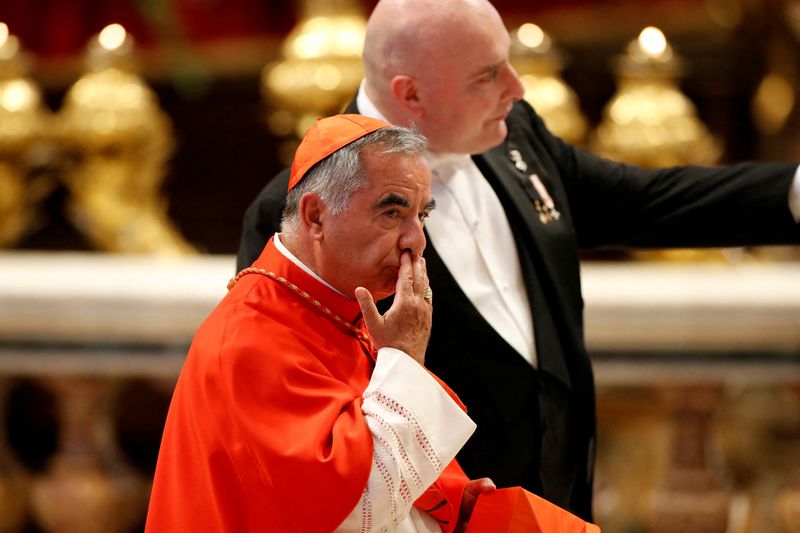Time behind bars for Cardinal Becciu? Not any time soon, experts say
2023.12.17 07:24
3/3

© Reuters. FILE PHOTO: Cardinal Angelo Becciu arrives at a consistory ceremony to elevate Roman Catholic prelates to the rank of cardinal, at Saint Peter’s Basilica at the Vatican, August 27, 2022. REUTERS/Remo Casilli/File Photo
2/3
By Philip Pullella
VATICAN CITY (Reuters) – None of the six people who received jail sentences at end of the Vatican’s big corruption trial on Saturday will likely be spending behind bars anytime soon and some perhaps not ever, according to legal and security experts.
Several, including Cardinal Angelo Becciu, the most senior Catholic Church official ever to stand trial before a Vatican criminal court, and London-based Italian financier Raffaele Mincione, already have announced appeals. Others are expected to join them. All the defendants had denied wrongdoing.
A new trial would likely not start before the end of next year and take at least another year to conclude. The court is not expected to publish its lengthy report explaining the reasoning for its decisions before April, legal experts said.
Normally, those awaiting appeals in Vatican cases, whose incarceration procedures closely mirror Italy’s, are allowed to remain free unless they have committed violent crimes or are a flight risk.
Becciu is the only Vatican citizen among them. He lives in an apartment inside the tiny city-state, which Pope Francis allowed him to keep after he was abruptly fired in 2020 on accusations of nepotism. Becciu denied them then and during the trial.
The pope has already stripped Becciu of his right to enter a conclave that would choose the next pope after Francis’s death or resignation.
As supreme monarch, Francis could pardon Becciu for the financial crimes and mete out some other, symbolic punishment, such as ordering him to leave the Vatican and to return to his native Sardinia, one expert said.
In 2012, the late Pope Benedict pardoned his butler, Paolo Gabriele, who was convicted of leaking sensitive documents and was sentenced to 18 months in jail.
DOES THE VATICAN HAVE A PRISON?
Gabriele spent about three months in the barracks of the Vatican police, which has about four rooms that are used as cells. They have bars on the windows and re-enforced steel doors.
Apart from Gabriele and few other cases, the cells are usually used to hold briefly those caught for petty crimes such as pickpocketing or vandalism on Vatican territory, including St. Peter’s Square of the Vatican Museums.
They are handed over to Italian police and, if they are foreigners, they are usually expelled.
An Italian priest was held in one of the cells while awaiting trial on pornography charges in 2018.
Jozef Wesolowski, a former archbishop and papal ambassador to the Dominican Republic, was held while awaiting trial on criminal charges of paying for sex with minors and possessing child pornography. He died before it began.
Some of the Vatican’s policies on prisoners are regulated by the 1929 Lateran Pacts between Italy and the Holy See that recognised the Vatican as a sovereign city-state.
As part of that pact, those convicted in the Vatican can be sent to Italian prisons to serve their terms, but usually not the other way around.
Since the Vatican is a sovereign monarchy, a complicated process of international arrest warrants and extraditions must be followed, even concerning any eventual arrests in Italy.
It has not always worked out in the Vatican’s favour.
In 2021, Cecilia Marogna, one of the defendants who was convicted by the Vatican court on Saturday, was arrested by Italian police in Milan acting on an international warrant from Vatican prosecutors.
She was released after about two weeks and never attended any of the trial’s 86 sessions.
Gianluigi Torzi, a London-based financier who was also convicted on Saturday, entered the Vatican in 2020 to talk to prosecutors. He was arrested and held for about 10 days. Torzi also never attended any of the trial sessions.
In 2021 a London court revoked an earlier order that had frozen Torzi’s funds in the British capital, saying that Vatican prosecutors had made “appalling” misinterpretations in its initial request.








